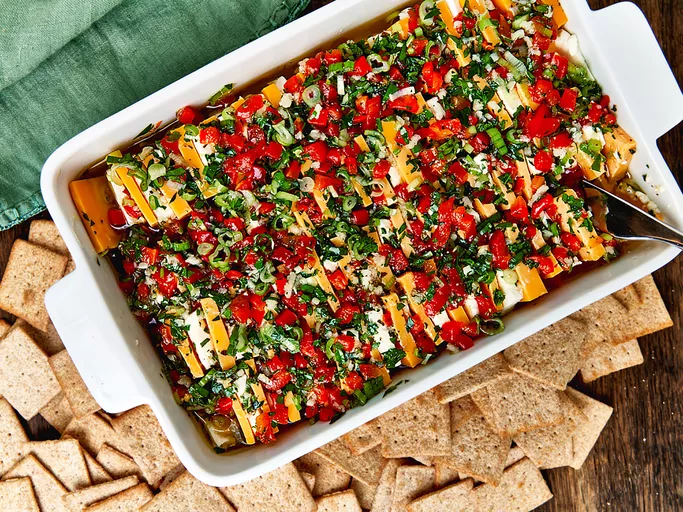Marinated Cheese Recipe Basics
Cheese Selection
The art of marinating cheese is a simple yet elegant way to elevate the flavor and texture of this versatile ingredient. A well-crafted marinade can add depth, complexity, and even umami flavors to cheese, making it perfect for snacking, entertaining, or adding a gourmet touch to your favorite dishes.
Cheese Selection: When choosing a cheese for marinating, consider the type, texture, and flavor profile you want to achieve. Here are some popular options:
- Firm Cheeses: Cheddar, Parmesan, and Pecorino Romano work well due to their dense, compact texture that holds up to the marinade.
- Semi-Soft Cheeses: Gouda, Havarti, and Muenster are suitable choices as they have a smooth texture that absorbs flavors evenly.
- Bleu or Soft-Ripened Cheeses: Consider using Blue Cheese, Camembert, or Brie for their creamy texture and strong, pungent flavors.
Basic Marinated Cheese Recipe: The foundation of a good marinade consists of three key elements: oil, acid (such as vinegar), and spices. Here’s a basic recipe you can modify to suit your taste:
1 cup neutral oil (e.g., grapeseed or sunflower) 2 tablespoons acid (e.g., apple cider vinegar or lemon juice) 2 cloves garlic, minced 1 teaspoon dried herbs (e.g., thyme, rosemary, or oregano) Salt and pepper to taste
Add the cheese slices to a shallow dish or a ziplock bag, pour the marinade over them, and refrigerate for at least 2 hours or up to 24 hours. The longer it marinates, the deeper the flavors will penetrate.
Tips and Variations:
- For a Mediterranean flair, add chopped olives, artichoke hearts, or sun-dried tomatoes to the marinade.
- To give your cheese an Asian-inspired twist, use soy sauce, rice vinegar, and sesame oil in the marinade.
- Experiment with different types of cheese, like Goat Cheese or Feta, for unique flavor profiles.
With this basic recipe as a starting point, feel free to experiment and create your own signature marinated cheese creations!
Select a firm cheese with a mild flavor such as Mozzarella or Cheddar. Soft cheeses like Brie or Feta may break down too quickly during marinating.
Selecting the right cheese for a marinated cheese recipe is crucial, as it will greatly impact the final flavor and texture of the dish. A firm cheese with a mild flavor is ideal for marinating. This type of cheese can hold its shape and absorb flavors well without breaking down too quickly.
Some popular options for firm cheeses include Mozzarella, Cheddar, and Gouda. These cheeses have a relatively low moisture content, which makes them perfect for marinating. They also have a mild flavor that won’t overpower the other ingredients in the recipe.
Avoid using soft cheeses like Brie or Feta for marinating, as they may break down too quickly during the process. Soft cheeses are often high in moisture and can become too soft or even develop an off-flavor when exposed to acidic marinades.
When selecting a firm cheese, consider its flavor profile as well. A mild cheese will provide a neutral base for your marinated cheese recipe, while a stronger-tasting cheese like Parmesan or Blue Cheese can add more complexity and depth of flavor.
In addition to the type of cheese, it’s also essential to choose a marinade that complements the flavor of the cheese. Acidic ingredients like vinegar, citrus juice, or wine can help balance out the richness of the cheese, while herbs and spices can add freshness and aroma.
Remember to always use a clean and sanitized environment when marinating cheese to prevent contamination and foodborne illness. Store the marinated cheese in the refrigerator at a temperature below 40°F (4°C) and consume it within a few days for optimal flavor and texture.
To get started with your marinated cheese recipe, try combining a firm cheese like Mozzarella or Cheddar with a simple marinade made from olive oil, herbs, and spices. You can also experiment with different flavors by adding acidic ingredients like vinegar or citrus juice to the marinade.
With a little practice and experimentation, you can create delicious marinated cheese recipes that showcase the unique flavor and texture of your chosen cheese. Happy cooking!
Salt and Acid Balance
The art of crafting a delectable marinated cheese recipe involves striking a perfect balance between flavors, textures, and presentation. To achieve this harmony, it’s essential to grasp the fundamental basics of marination and the roles that salt and acid play in the process.
Marinated Cheese Recipe Basics
Marinating is essentially a method of soaking cheese in a flavorful liquid mixture, typically comprised of acidic and salty ingredients. This technique allows the cheese to absorb the flavors of the marinade, resulting in a more complex and enhanced taste experience.
Types of Marinated Cheese Recipes
- Fresh or soft cheeses, such as Mozzarella, Feta, or Goat cheese, are typically marinated to prevent spoilage and enhance their flavor profile.
- Semi-soft cheeses like Brie and Camembert can be marinated to develop a stronger aroma and richer taste.
- Hard cheeses, such as Parmesan and Cheddar, often undergo a longer marinating process to infuse the cheese with intense flavors.
Salt Balance in Marinated Cheese Recipes
Salt serves as a critical component in marination, acting as a preservative and enhancing flavor. However, an excessive salt content can lead to over-salting and affect the overall taste balance. To achieve an optimal salt balance:
- Use high-quality salts that are free of additives and chemicals.
- Select cheeses with natural moisture levels to minimize salt absorption.
- Avoid adding too much salt during the initial marinating stage, allowing it to develop over time instead.
Acid Balance in Marinated Cheese Recipes
The addition of acid, commonly in the form of vinegar or citrus juice, serves several purposes: balancing flavors, enhancing texture, and preventing spoilage. To maintain an ideal acid balance:
- Choose acidic ingredients that complement the cheese’s flavor profile.
- Avoid over-acidifying, as this can disrupt the cheese’s delicate texture and create an unpleasant taste experience.
- Prioritize the ratio of salt to acid: typically 1 part acid to 3-5 parts salt.
Ultimately, a harmonious balance between salt and acid in marinated cheese recipes depends on the type and quality of ingredients used. By understanding these fundamental basics and striking an optimal equilibrium between flavors and textures, you’ll be able to craft delicious and distinctive marinated cheeses that impress even the most discerning palates.
Use a ratio of 1 part salt to 5 parts acid (such as lemon juice or vinegar) to create a balanced marinade.
The art of marinating cheese involves creating a balance between flavors that enhance its natural taste without overpowering it. To achieve this delicate harmony, it’s crucial to understand the fundamental components of a marinade.
A basic marinade typically consists of three primary elements: oil (or fat), acid (such as lemon juice or vinegar), and seasonings. The ratio in which these ingredients are combined can significantly impact the final flavor profile of your marinated cheese.
When it comes to creating a balanced marinade, it’s often recommended to follow a general guideline of 1 part salt to 5 parts acid (such as lemon juice or vinegar). This allows for a delicate balance between the savory and tangy flavors. However, you can experiment with different proportions based on your personal preferences.
Oil plays a vital role in helping to distribute flavor throughout the cheese, but use it sparingly to avoid overpowering the other ingredients. Typically, 1 part oil is used for every 2 parts of acid and salt combined.
Herbs and spices are essential in adding depth and character to your marinated cheese. Choose a few that complement each other in terms of flavor profile, such as basil and garlic or thyme and black pepper. Remember, less is often more when it comes to herbs and spices – start with small amounts and adjust to taste.
When preparing the marinade, be sure to mix the ingredients together thoroughly before applying them to your cheese. This helps ensure that the flavors are evenly distributed throughout the cheese.
For the best results, choose a high-quality cheese that is suitable for marinating, such as mozzarella or feta. Soft-ripened cheeses like brie and goat cheese can be more delicate and may not hold up well to long-term marinating.
Cooking the cheese in the marinade before serving can add an extra layer of flavor, but it’s essential to keep an eye on the temperature to avoid overheating the cheese. A gentle heat source like a double boiler or low-temperature oven is ideal for cooking marinated cheese.
Marinade Preparation
Mixing the Marinade
The preparation of marinade is a crucial step in creating a delicious marinated cheese recipe, as it enhances the flavor and tenderness of the cheese.
To Prepare the Marinade, you will need the following ingredients:
- 1/2 cup of olive oil (Extra virgin olive oil is highly recommended)
- 1/4 cup of white wine vinegar
- 2 cloves of minced garlic
- 1 teaspoon of dried oregano
- 1/2 teaspoon of salt
- 1/4 teaspoon of black pepper (optional)
- Any other desired flavorings such as dried herbs, spices, or citrus zest
- Mix the marinade ingredients in a bowl until well combined.
To ensure that all the flavors are evenly distributed, make sure to mix the ingredients in the following order:
- Combine the olive oil and white wine vinegar in the bowl.
- Add the minced garlic and mix until it is fully incorporated into the mixture.
- Add the dried oregano, salt, and black pepper (if using) to the bowl. Mix well to combine.
After you have mixed all of the marinade ingredients together, taste the marinade and adjust the seasoning as needed. You may need to add more olive oil, vinegar, or herbs to suit your taste preferences.
Once you are satisfied with the flavor of the marinade, it is ready to use in your marinated cheese recipe.
Remember to always let the cheese sit for at least 30 minutes after applying the marinade to allow the flavors to penetrate evenly. The longer the cheese sits, the more flavorful it will become.
Combine oil, herbs, spices, and other flavorings with salt and acid. Stir well to dissolve solids.
The process of preparing a marinade for a marinated cheese recipe involves combining various ingredients to create a flavorful liquid that enhances the taste and texture of the cheese.
To start, gather all the necessary ingredients including oil, herbs, spices, and other flavorings such as garlic, onion powder, or paprika.
Next, combine the oil with salt in a bowl and stir well to dissolve any solids that may have formed during the storage process. Salt helps to balance the flavors and acts as a preservative.
Afterwards, add the herbs and spices to the mixture and stir again to ensure they are fully incorporated. The choice of herbs and spices will depend on the type of cheese being marinated and the desired flavor profile.
Add any additional flavorings such as garlic or onion powder at this stage and mix well. Acidic ingredients like lemon juice or vinegar may also be added to help break down the proteins in the cheese and create a more tender texture.
Once all the ingredients are combined, stir the marinade well to ensure that everything is fully dissolved and there are no lumps or solids remaining. The marinade should be smooth and even in color.
A good rule of thumb is to use a ratio of 2 parts oil to 1 part acid (such as lemon juice) when creating a marinade for cheese. This will help to balance the flavors and prevent the cheese from becoming too salty or overpowering.
Here’s an example of how you can combine some common ingredients to create a basic marinade:
- Oil (2 parts)
- Salt (1 part)
- Parsley (1/4 teaspoon)
- Garlic powder (1/8 teaspoon)
- Black pepper (1/16 teaspoon)
- Lemon juice (2 tablespoons)
This basic marinade can be adjusted to suit the specific needs and tastes of your cheese. For example, you could add more garlic or onion powder for a stronger flavor, or use different herbs such as thyme or rosemary for a unique taste.
Cheese Immersion Time
To prepare a delicious marinated cheese recipe, it’s essential to focus on proper marinade preparation and precise cheese immersion time.
First, you need to create an effective marinade for your chosen type of cheese. A good marinade typically consists of acidic ingredients such as vinegar or lemon juice, which help break down the cheese’s proteins and add flavor.
You can also include other ingredients like herbs, spices, garlic, and onion to give your cheese a more complex taste. For example, you could try using thyme, rosemary, or oregano for their distinctive flavors.
Mix the marinade ingredients together in a bowl until they are well combined. Make sure to store them in an airtight container in the refrigerator until you’re ready to use them.
Now, let’s talk about cheese immersion time. The longer your cheese spends in the marinade, the more flavorful it will become. However, be careful not to overdo it, as this can lead to an overly soggy or moldy texture.
A good rule of thumb is to start with a short immersion time, such as 30 minutes to an hour, and gradually increase the duration based on your personal preference. For example, you could try marinating for 2-3 hours or even overnight.
Remember to always keep an eye on your cheese while it’s marinating, as it can become too strong if left for too long. If you notice any signs of spoilage, such as a sour smell or slimy texture, discard the cheese immediately.
To ensure that your cheese is properly cooled and ready to eat, make sure to store it in the refrigerator for at least 30 minutes after marinating. This will allow the flavors to meld together and the cheese to set.
Place cheese in a shallow dish or ziplock bag, pouring marinade over it. Cover the dish or seal the bag, refrigerating at 40°F (4°C) for several hours or overnight.
The key to a successful marinade is to ensure that the cheese is properly coated in the marinade, allowing it to absorb all the flavors and aromas.
To prepare the marinade for your Marinated Cheese Recipe, you will need a combination of ingredients that enhance the flavor and texture of the cheese. Common ingredients include olive oil, acidic elements like vinegar or lemon juice, herbs such as parsley, rosemary, or thyme, spices like garlic powder or onion powder, salt, and sugar.
Here are some steps to follow when preparing your marinade:
- Pour the olive oil, vinegar or lemon juice, minced herbs, and ground spices into a bowl. Whisk or stir well until you get a smooth paste.
- Add the salt and sugar to the mixture and whisk until dissolved.
To apply the marinade to your cheese, follow these steps:
- Place the cheese in a shallow dish or a ziplock bag. You can also use individual portions of cheese for each serving.
- Pour the prepared marinade over the cheese. Ensure that all surfaces are well coated with the marinade.
Covering and Refrigeration:
- Close or cover the dish, ensuring it’s airtight to prevent any leakage.
- If using a ziplock bag, seal it tightly by twisting and turning the top until you hear it pop into place.
- Place the covered dish or sealed bag in the refrigerator at a temperature of 40°F (4°C) or below for several hours or overnight. This allows the cheese to fully absorb all the flavors from the marinade.
After the refrigeration period, remove the cheese from the marinade and use it as desired, such as grating, slicing, or crumbing for various recipes.
Marinated Cheese Serving and Storage
Temperature Control
The marinating process involves immersing cheese slices or cubes in a seasoned brine solution to enhance flavor and texture. The marination time can vary depending on the type of cheese, but it usually takes anywhere from 30 minutes to several hours.
For optimal results, marinated cheese should be stored at refrigerated temperatures below 40°F (4°C). This is essential to prevent bacterial growth and spoilage. When storing marinated cheese, make sure to keep it covered with plastic wrap or aluminum foil to maintain a humid environment.
Avoid direct sunlight exposure and heat sources when storing marinated cheese. The ideal storage conditions for marinated cheese are in the refrigerator’s crisper drawer, which maintains a consistent humidity level.
Temperature control is crucial during marination, as high temperatures can cause the cheese to melt or separate from its marinade. To prevent this, marinate the cheese at room temperature (around 70°F/21°C) for a specified period before refrigerating it.
When serving marinated cheese, consider using chilled glasses or platters to keep the cheese at an optimal serving temperature between 45°F and 55°F (7°C and 13°C). You can also garnish with herbs, edible flowers, or other ingredients to enhance the visual appeal of your dish.
It’s worth noting that marinated cheese can be served as a standalone appetizer or used as an ingredient in various recipes, such as sandwiches, salads, or dips. In either case, ensure that you handle and serve it safely to maintain food quality and prevent spoilage.
Serve marinated cheese chilled, never above refrigerator temperature. For longer storage, freeze at 18°C (0°F).
- To fully appreciate the flavors and textures developed during the marination process, it’s essential to serve marinated cheese at the optimal temperature.
- Serve the marinated cheese chilled, but never above refrigerator temperature.
- This helps preserve the delicate balance of flavors and prevents the growth of bacteria or other microorganisms that could compromise food safety.
- When serving, consider pairing the marinated cheese with crackers, bread, fruits, or vegetables to create a beautiful platter or board.
- This not only adds visual appeal but also provides a variety of textures and flavors for guests to enjoy.
- For longer storage, freezing is an excellent option to maintain the quality and safety of the marinated cheese.
- To freeze, wrap the marinated cheese tightly in plastic wrap or aluminum foil and place it in a freezer-safe container or bag.
- Store the frozen marinated cheese at 18°C (0°F) or below to prevent the growth of ice crystals that could cause texture changes or the development of off-flavors.
- When you’re ready to serve, simply thaw the frozen marinated cheese in the refrigerator overnight and serve chilled.
- This method allows you to enjoy your marinated cheese at its best while minimizing the risk of spoilage or foodborne illness.
By following these simple guidelines for serving and storage, you’ll be able to fully appreciate the flavors and textures developed during the marination process and enjoy your delicious marinated cheese for a longer period.
Safety Precautions
Serving marinated cheese requires attention to several factors to maintain its quality and safety for consumption.
The first consideration when serving marinated cheese is to ensure that it reaches a safe temperature before serving. Marinated cheeses, particularly those made with soft cheeses or dairy products, can be susceptible to contamination by bacteria such as Listeria monocytogenes.
To mitigate this risk, marinated cheese should always be stored in the refrigerator at 40°F (4°C) or below and allowed to reach room temperature for no more than two hours before serving.
When serving, consider slicing the marinated cheese into thin pieces or using a cheese spreader or knife to minimize contact with potentially contaminated surfaces. Clean your hands thoroughly before handling the cheese, and avoid touching your eyes, nose, or mouth after handling the cheese.
The second consideration is to maintain proper food safety practices when serving marinated cheese at parties, gatherings, or other events where perishable foods are handled and stored improperly.
It’s crucial to use separate utensils, cutting boards, and platters for raw and cooked meats, poultry, seafood, dairy products, fruits, vegetables, cooked leftovers, and ready-to-eat foods such as marinated cheese. Labeling and dating food items can also help prevent confusion about what needs to be discarded or served first.
When it’s time to store leftover marinated cheese, reheat or refrigerate the dish promptly to prevent spoilage or bacterial growth. Reheating should not occur at high temperatures for extended periods, as this can promote bacterial growth and lead to foodborne illnesses.
Safe storage of leftover marinated cheese includes using sealed containers with a tight-fitting lid, wrapping it tightly in plastic wrap or aluminum foil, or placing the cheese in an airtight container within the refrigerator. It’s also essential to discard any unused or unsealed marinated cheese after two hours of exposure to room temperature.
Lastly, keep marinated cheese away from strong-smelling foods and avoid cross-contamination by cleaning and sanitizing your hands and utensils frequently when handling and storing these perishable items.
Awareness about proper serving and storage methods will not only maintain the quality of the marinated cheese but also minimize health risks associated with foodborne illnesses.
Check the cheese regularly for spoilage or mold growth during refrigeration or freezing, discarding it if necessary to prevent foodborne illness.
Serving marinated cheese is a delicate task that requires attention to detail and proper storage techniques to maintain its quality and safety.
To ensure the best flavor and texture, marinated cheese should be served at room temperature, allowing the flavors to meld together and the cheese to soften slightly.
When serving marinated cheese, it’s essential to handle it safely to prevent cross-contamination. Use a clean utensil to serve the cheese, and consider using small portions or individual servings to reduce handling and exposure.
Marinated cheese can be served on its own as an appetizer or used as an ingredient in various dishes, such as sandwiches, salads, or pasta sauces.
In terms of serving suggestions, marinated cheese pairs well with crackers, bread, fruit, or nuts. It’s also a great addition to charcuterie boards or platters.
When it comes to storage, marinated cheese requires proper refrigeration or freezing to prevent spoilage and maintain its quality.
If refrigerating, place the marinated cheese in a covered container and store it in the refrigerator at a temperature of 40°F (4°C) or below. Check the cheese regularly for signs of spoilage, such as off odors, slimy texture, or mold growth.
If freezing, wrap the marinated cheese tightly in plastic wrap or aluminum foil and place it in a freezer-safe bag or container. Store it in the freezer at 0°F (-18°C) or below for up to 3-4 months.
When thawing frozen marinated cheese, do so slowly in the refrigerator or by leaving it overnight in cold water. Never thaw it at room temperature or in hot water, as this can lead to bacterial growth and foodborne illness.
Regardless of storage method, always check the cheese regularly for signs of spoilage or mold growth during refrigeration or freezing. Discard it if necessary to prevent foodborne illness.
To extend the shelf life of marinated cheese, consider using a higher acidity level in the marinade or adding preservatives like salt or sugar.
Remember, proper handling and storage are crucial when working with marinated cheese. Always follow safe food handling practices to ensure the quality and safety of your product.
- Best LeadsGorilla Alternatives for 2025 - April 22, 2025
- Best Leadzai Alternatives for 2025 - April 22, 2025
- Best LeadSwift Alternatives for 2025 - April 21, 2025















